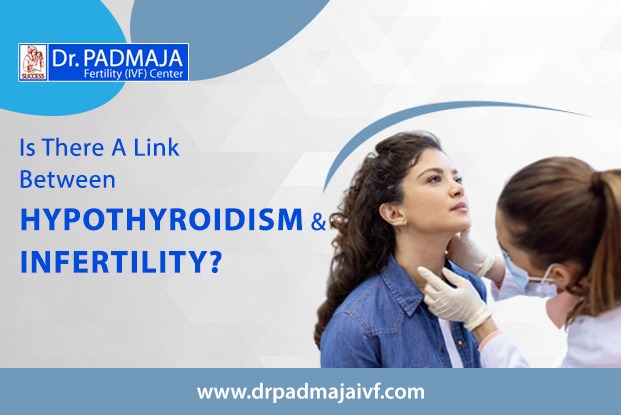Infertility is a growing concern among couples trying to conceive, and it’s often linked to hormonal imbalances in the body. A disorder called hypothyroidism, in which the thyroid gland produces insufficient thyroid hormones, is a common but sometimes disregarded cause of infertility. These hormones play a crucial role in regulating metabolism, menstrual cycles, and reproductive health.
But how exactly does hypothyroidism affect fertility? Can it prevent pregnancy? And more importantly, is it treatable? In this blog, we explore the connection between hypothyroidism and infertility, and how centers like Dr Padmaja IVF Center, one of the best fertility treatment centers in Hyderabad, are compassionately and skillfully assisting women in managing thyroid-related fertility difficulties.
Understanding Hypothyroidism
The thyroid is a little gland in the neck that resembles a butterfly. It produces hormones that help control your metabolism, body temperature, and various bodily functions—including reproductive health. Low blood levels of thyroid hormones are the result of the gland becoming underactive in hypothyroidism.
Common symptoms of hypothyroidism include:
Fatigue
Weight gain
Irregular or missed periods
Depression
Cold intolerance
Hair thinning
While these symptoms are troubling on their own, they can also affect fertility in subtle but significant ways.
How Hypothyroidism Affects Fertility
Thyroid hormones are directly involved in the regulation of the menstrual cycle and ovulation. When thyroid levels are off balance, it can cause:
Irregular Ovulation or Anovulation: Without regular ovulation, the chances of natural conception are greatly reduced.
Luteal Phase Defect: In some women, hypothyroidism leads to a shortened luteal phase, making it harder for a fertilized egg to implant in the uterus.
Increased Prolactin Levels: Hypothyroidism can raise prolactin levels, which may inhibit ovulation altogether.
Menstrual Irregularities: From skipped periods to heavy bleeding, hormone imbalance due to hypothyroidism can throw menstrual cycles into chaos.
All of these factors contribute to difficulty conceiving, which is why managing thyroid health is an essential part of fertility treatment.
Hypothyroidism and Pregnancy Risks
Even if conception occurs, untreated hypothyroidism during pregnancy can lead to complications such as:
Miscarriage
Preterm delivery
Low birth weight
Developmental delays in the baby
Experts at leading fertility clinics stress early identification and appropriate thyroid function management both before and throughout pregnancy because of this.
Diagnosis and Treatment
Thankfully, a straightforward blood test that gauges thyroid-stimulating hormone (TSH) and T4 levels makes diagnosing hypothyroidism uncomplicated. Once diagnosed, the condition can usually be managed effectively with synthetic thyroid hormone medication (Levothyroxine).
At the DrPadmaja Fertility Center, one of the best fertility treatment centers in Hyderabad, doctors routinely screen for thyroid function as part of the fertility evaluation process. The goal is to ensure that all underlying hormonal imbalances are addressed before beginning advanced treatments like IUI or IVF.
How the Best Fertility Centres in Hyderabad Can Help
Managing infertility caused by hypothyroidism requires a comprehensive and personalized approach. At the Dr Padmaja IVF Center, known as one of the best IVF centers in Hyderabad, patients receive more than just medical treatment—they receive emotional support, lifestyle guidance, and tailored care plans that consider the full picture of their reproductive health.
Here’s how they can help:
Thorough Diagnostic Tests: Hormone panels, thyroid testing, and ultrasound scans to understand the root causes of infertility.
Endocrine Support: Expert endocrinologists work alongside fertility specialists to manage thyroid levels effectively.
Customized Fertility Plans: Depending on the severity of the condition, treatment may include medication alone or be combined with assisted reproductive techniques.
Monitoring During Pregnancy: For women who conceive, ongoing thyroid monitoring ensures a healthy pregnancy and safe delivery.
As one of the best fertility centres in Hyderabad, Dr Padmaja Fertility Center has helped many women with hypothyroidism successfully conceive and deliver healthy babies through its expert care and advanced treatment options.
Final Thoughts
Hypothyroidism can be a hidden obstacle in your journey to parenthood, but it’s not an insurmountable one. Overcoming thyroid-related infertility and achieving your goal of parenthood requires prompt diagnosis, appropriate therapy, and a strong support network.
If you suspect that thyroid issues may be affecting your fertility, don’t wait. Reach out to trusted experts at the Dr Padmaja IVF Center, widely recognized as a best IVF center in Hyderabad. Their experienced team will guide you with empathy, cutting-edge technology, and a commitment to helping you achieve your family goals.
Infertility may feel like a lonely road—but with the right help, hope and healing are always within reach.
About the Author

This blog is penned by a devoted content specialist passionate about raising awareness around fertility treatments and emotional well- being. With in- depth disquisition on motifs like IVF and fertility, the thing is to give precious perceptivity for couples on their trip to parenthood.
Frequently Asked Questions (FAQs)
- How does hypothyroidism affect fertility in women?
Hypothyroidism can lead to irregular or absent menstrual periods, anovulation (lack of ovulation), and hormonal imbalances. These issues can make it more difficult to conceive and may increase the risk of miscarriage.
- Can hypothyroidism cause infertility in men?
Yes. In men, hypothyroidism can lead to decreased libido, erectile dysfunction, reduced sperm count, and motility issues, all of which may contribute to infertility.
- What are the symptoms of hypothyroidism that may impact fertility?
Common symptoms include fatigue, weight gain, cold intolerance, depression, hair thinning, irregular periods, and low libido. These symptoms can indicate underlying thyroid dysfunction that affects reproductive health.
- Can treating hypothyroidism restore fertility?
In many cases, yes. Proper treatment with thyroid hormone replacement (like levothyroxine) can regulate menstrual cycles, restore ovulation, and improve the chances of conception.
- Should I get my thyroid checked if I’m trying to conceive?
Absolutely. If you’re experiencing infertility or irregular menstrual cycles, a thyroid function test (TSH, Free T3, Free T4) is an important diagnostic tool your doctor may recommend.
- What is subclinical hypothyroidism and does it affect fertility?
Subclinical hypothyroidism is a mild form of thyroid dysfunction where TSH levels are slightly elevated, but T3 and T4 remain normal. It can still impact fertility and pregnancy outcomes, especially in women with a history of miscarriage or ovulatory issues.
- Can hypothyroidism cause miscarriage or complications during pregnancy?
Yes. Untreated or poorly managed hypothyroidism during pregnancy increases the risk of miscarriage, preeclampsia, low birth weight, and developmental issues in the baby.

